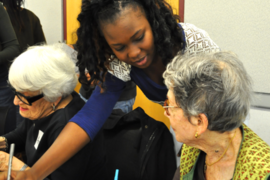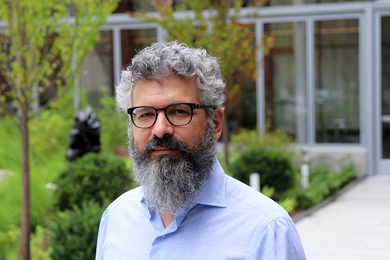For most students, senior year of college is a time to reminisce with friends and professors, a time to celebrate, and a time to look forward to new beginnings.
The Class of 2020 will experience something different.
For Steven Truong, a senior in the Department of Biological Engineering, the Covid-19 global pandemic sent him home from MIT to Minnesota, away from friends and colleagues and to where his Vietnamese family relies on his comparatively rich medical knowledge for information.
“I think my closest friends and I have been really good at reaching out to each other. But I really do miss the day-to-day interactions because those interactions are what really count,” says Truong. “There's nothing quite like working on a pset with someone at, say 2 a.m. in the morning. It's really part of the MIT experience.”
Truong, along with students across the country, now must navigate life at home while trying to complete school work and manage additional stressors that have accompanied the pandemic.
A new normal
A typical day for Truong now, perhaps unsurprisingly, hardly resembles a pre-Covid-19 day. Aside from irregular sleep hours and continuing school work, Truong must also help his Vietnamese mother file unemployment paperwork in English and advise his family on medical matters.
“People like my grandma, for example, are having to basically resort to me for medical advice,” he says. “It's really hard to set up a doctor who is willing to do telemedicine with you when you also need a translator.”
Take, for example, a recent scare his grandmother had when she started taking two medications that were not supposed to be mixed. Truong doesn’t know whether that detail was lost in translation or if the doctor genuinely prescribed the two medications together. However, Truong’s research experience through MIT’s Undergraduate Research Opportunities Program (UROP) provided him with the skills he needed to step in before his grandmother’s condition deteriorated further. He could read the clinical papers and discern that the trials’ data suggested not to take the two medications concurrently.
“She couldn't go to the doctor right now, and I needed to step in and say, ‘Hey, don't take these two drugs together’ … that had to be the fix to her problems when you can’t be with a doctor,” Truong says.
Truong also worries that his family and others are at an increased risk for misinformation due to their struggle to read English. Distributing content from credible sources, like MIT News or the U.S. Centers for Disease Control and Prevention, to non-native English speakers is difficult when those sources are competing with inaccurate articles written in their native language. In particular, a viral Facebook post from Vietnam about using warm water to flush the coronavirus from the body reached his family in Minnesota. Truong’s extensive UROP experiences in immunology at MIT have enabled him to understand much of the current research around Covid-19 and, in turn, enabled him to debunk inaccurate information for his family.
Between caring for his grandmother, helping his family find credible information, and preparing to graduate, Truong finds himself increasingly missing his father, who died a year and a half ago.
“Back in the day, my dad would have done all this,” Truong says, recalling helping his mother with her unemployment forms and sorting out his grandmother’s medical problems. “So I basically needed to step because not many people in the family are educated enough to even do a search on these sorts of things.”
An uncertain future
Truong, like many, is taking life day by day. MIT’s recent announcement canceling Commencement ceremonies left him and many other students longing for last chances to say goodbyes to friends and professors.
With the early departure from campus, Truong laments budding friendships from the beginning of the semester that will never fully reach fruition.
“I had already been making some new friends this semester. And I think that those friendships could have been a bit deeper had I been in contact with them,” he says. But at the end of each day, he looks forward to speaking with his partner, who he met at MIT.
The Covid-19 pandemic has also thrown many students’ post-graduation plans into question, and Truong is no exception. Set to start a Marshall scholarship appointment in the UK in the fall, he now is not certain whether that appointment will proceed. A delay in his Marshall scholarship would further complicate his plans to apply for and obtain an MD/PhD.
“I just hope that [the Marshall] doesn't get deferred for another year because I think I have way too much school ... having to delay things for another year [would] be non-ideal,” Truong says.
But he also notes the support he’s received from across MIT. A scholarship from MIT Student Financial Services has enabled him to focus on his education rather than worry about tuition refunds. MIT professors have accommodated the abrupt life changes by extending deadlines or readjusting requirements. Finally, consistent check-ins from his UROP mentors, advisors from the Distinguished Fellowships Office, and faculty and staff from the Department of Biological Engineering (BE) have left Truong feeling supported throughout this time.
Finding the bright side
Despite looming uncertainties about the future, Truong is focusing on the good things. Recently, the BE department hosted a virtual ceremony for its seniors. Truong received a certificate celebrating his successful endeavor to complete the coursework to meet the requirements of the BE undergraduate program.
As MIT seniors look toward participating in a virtual commencement, Truong takes comfort in the fact that he will be with his father during the official ceremonies after all.
“Now that the coronavirus has happened, we can watch commencement together in the comfort of our house and on his altar,” Truong says. “It’s just an emotionally weird time.”
Despite the weirdness, Truong is grateful for this time with his family. He talks regularly with his mother and grandmother and is reconnecting with his younger brother.
“If there's [a silver lining] that's really shining right now, it's that I get to see how my brother’s grown up ... he's changed in so many ways that I hadn't anticipated. I get to actually see that right now.”












